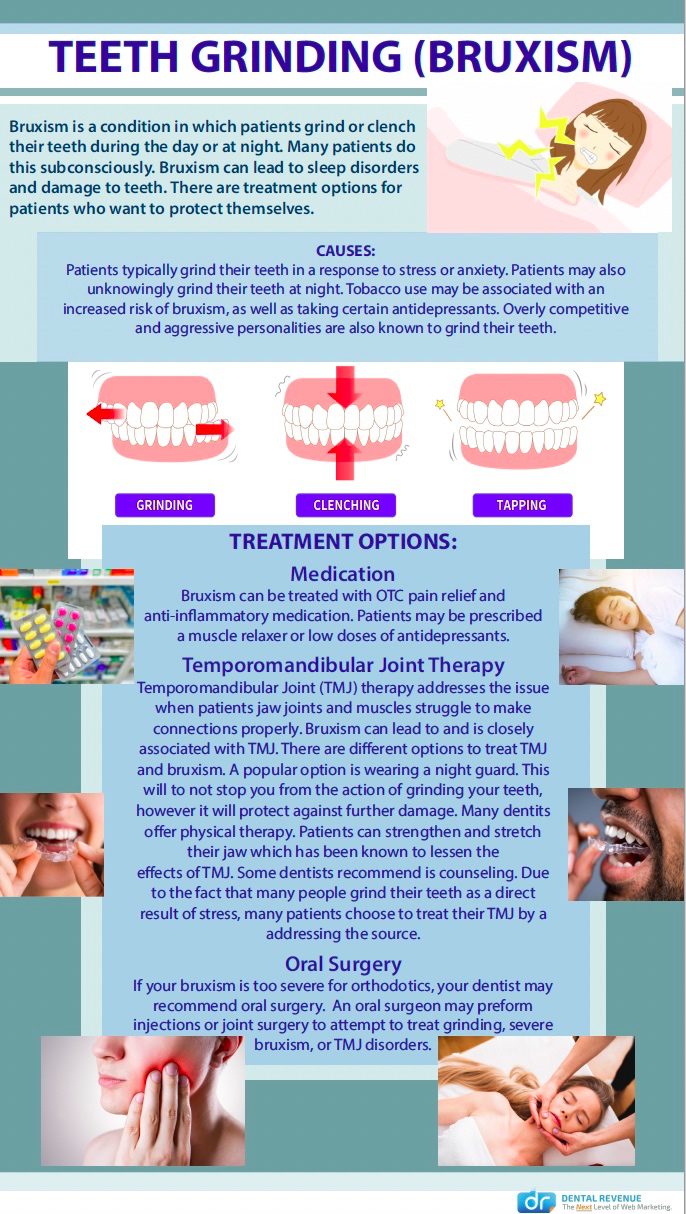Millions of people are affected by bruxism or teeth grinding. Bruxism is a condition in which you clench or grind teeth. Many people do not realize that they grind their teeth as most teeth grinding takes place at night while they sleep. A mild case of teeth grinding may not require treatment, but teeth grinding can lead to serious jaw disorders, headaches, damaged teeth, and other problems. Bruxism is one of the common dental concerns Dr. Rajeev Upadya treats in his East Hanover, New Jersey, office.
Signs and Symptoms of Teeth Grinding
Teeth grinding typically occurs during sleep and is loud enough to wake your sleep partner. Many patients affected by bruxism experience the following:
- Worn, flattened, fractured, or chipped teeth
- Worn tooth enamel
- Tooth Sensitivity
- Jaw pain or tightness in the jaw muscles
- Earache
- Headache
- Facial pain
- Damaged tissue on the inside of your cheek
Teeth Grinding Causes
One of the most common teeth-grinding causes is stress. Patients who have stress-induced teeth grinding may benefit from biofeedback, yoga, anxiety medication, or other stress relief methods. Other teeth-grinding causes may include:
- Malocclusion (improper alignment of teeth)
- Temporomandibular Joint Dysfunction (TMD)
- Parkinson’s Disease, Huntington’s Disease
- Anxiety, anger, or tension

Treatment For Teeth Grinding at Metropolitan Center for Complete Dentistry
There are several treatment options for people affected by bruxism. One of the first steps in teeth grinding treatment is to stop the patient from grinding or clenching the teeth. Often, this is accomplished with a mouthguard or night guard. Another step is to correct the source of the problem, be it malocclusion, environmental factors, or TMJ disorder. Finally, Dr. Upadya will fix any damage that has occurred to teeth.
Diagnosing Teeth Grinding
Dr. Upadya can often diagnose teeth grinding through a simple visual examination. There are common, tell-tale signs of teeth grinding. When bruxism is identified as a problem either by the patient or the dentist, Dr. Upadya will use state-of-the-art diagnostic equipment to determine the underlying cause for concern to create a customized treatment plan.
Teeth Grinding Mouthguard
A mouthguard, or night guard, for teeth grinding is one of the most common treatments for bruxism. These removable appliances are custom-made to fit over your teeth and prevent teeth grinding. Mouthguards are typically worn at night, though some patients do benefit from wearing mouthguards during the day, particularly in high-stress situations such as while driving.
Repairing the Damage
Unfortunately, if teeth grinding goes undiagnosed for a long time, it can cause a lot of damage to your teeth. Worn down, broken, and chipped teeth must be repaired to prevent even further complex dental issues. Dr. Raj Upadya will use dental crowns, porcelain veneers, or cosmetic bonding to repair teeth and give you back a healthy, functional, and beautiful smile. Once your teeth are repaired, wearing your mouthguard to protect your new teeth is very important.
Teeth Grinding FAQs
What vitamin deficiency causes teeth grinding?
Having a vitamin D or calcium deficiency can be linked with teeth grinding. Taking vitamin supplements may help lessen mild bruxism in most patients. Although it is not a cure, you should visit a dentist for professional treatment.
Is teeth grinding caused by stress?
Teeth grinding is often caused by stress. People who are stressed or anxious may grind their teeth without noticing the negative behavior.
How do I relax my jaw?
The best way to relax your jaw is to move it in small motions and warm up your jaw muscles. Patients may open their mouths and close them slightly until this motion is comfortable. Then, they may also push against their front teeth to stretch their jaw.
What do dentists do for grinding teeth?
The most common treatment provided for teeth grinding is wearing a night guard to protect against grinding. This does not stop patients from grinding their teeth; however, it protects the surface of teeth so no further damage is caused and helps train your jaw to align properly.
Should I wear a night guard if I grind my teeth?
Night guards are recommended for patients who struggle with bruxism. They provide a protective layer between your teeth so there is no damage to the surface or enamel if
Can teeth break from grinding?
Teeth can break and crack from grinding. Over time, the pressure that grinding puts on your teeth can cause significant damage. It may even result in tooth loss.
Do worn teeth grow back?
Worn-down teeth cannot grow back. Once tooth enamel has been damaged or removed, it cannot be regenerated naturally. Restorative dentistry can help fix any functional issues grinding may have caused, while cosmetic dentistry can help fix any aesthetic issues.
Schedule a dental exam and teeth grinding consultation today. If you are searching for a New Jersey dentist to treat teeth grinding, contact the Metropolitan Center for Complete Dentistry in East Hanover to make an appointment with Dr. Raj Upadya. We gladly welcome new patients and out-of-town patients. Call us at 973-241-5169 or request an appointment online today.
